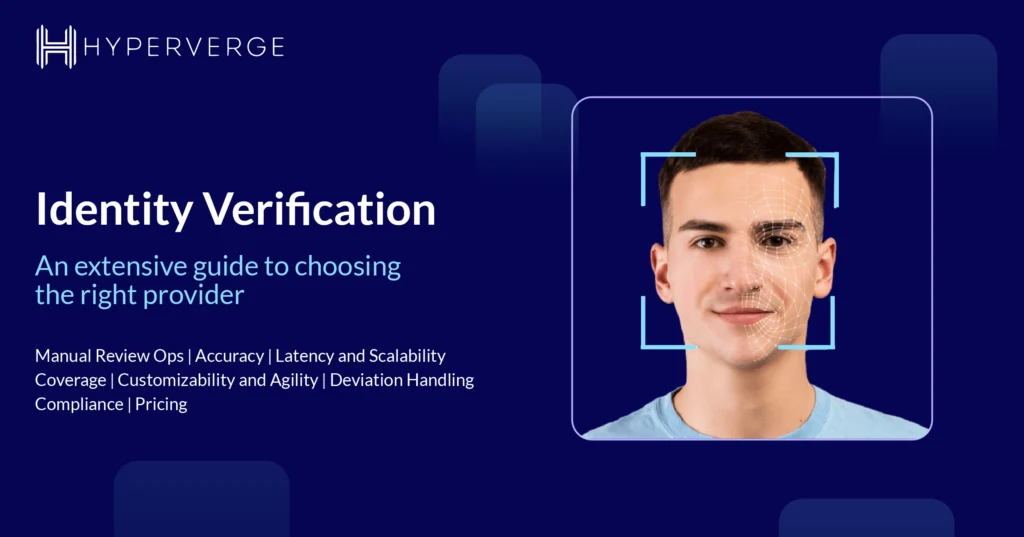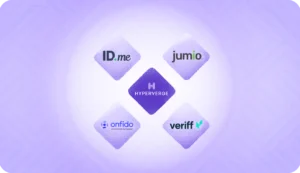Choosing the right identity verification solution is a pivotal decision for businesses and organizations aiming to fortify their security measures while providing a smooth customer experience. In this guide, we will provide insights on how to navigate the decision-making process for choosing the best solution for your needs.
We’ll also shed light on the top 5 identity verification solutions that are poised to redefine security protocols in 2024.
Table of Contents
- What is identity verification?
- Which Industries Require Identity Verification?
- Must-have Features in Identity Verification Solutions
- Choosing an Identity Verification Software: Key Factors to Consider
- Top 5 Identity Verification Tools
What is Online Identity Verification?
The identity verification process confirms that an individual’s digital identity matches the information they provide. It involves verifying personal information, such as name, address, date of birth, and social security number, against reliable data sources. By utilizing various techniques, such as document verification, facial recognition, biometric matching, and artificial intelligence, identity verification solutions ensure the authenticity of an individual’s identity.
Identity verification is crucial for numerous reasons. It helps prevent identity theft, account takeovers, and fraudulent activities. Additionally, it enables businesses to comply with regulations, such as Know Your Customer (KYC) and Anti-Money Laundering (AML) requirements.
Read more: What is Digital Identity Verification: Your Complete Guide to Safe User Onboarding
What is an Identity Verification Software?
Identity verification tools provide a secure and reliable means of confirming identity through techniques such as AI-powered document verification, face recognition, biometric matching, and artificial intelligence.
Which Industries Require Identity Verification?
Identity verification is a crucial practice employed across diverse industries to enhance security and ensure compliance with regulatory standards.
Financial institutions, including banks and credit unions, utilize identity verification to thwart fraudulent transactions, comply with regulations, and establish trust with customers.
In e-commerce, the focus is on securing transactions by verifying customer identities through methods like credit card verification and multi-factor authentication.
In healthcare, robust identity verification safeguards sensitive patient information, preventing unauthorized access and mitigating the risk of medical identity theft. The online gaming sector employs identity verification to ensure legal age requirements and deter fraudulent activities while ride-sharing and gig economy services prioritize safety by verifying the identities of drivers and passengers.

Must-have Features in ID Verification Solutions
When selecting an identity verification solution, certain features are crucial to ensure its effectiveness. Here are some must-have features to consider:
Anti-money Laundering Compliance (AML) and KYC Compliance
KYC compliance and AML Compliance with regulations are of utmost importance when it comes to identity verification. The solution you choose must meet the necessary legal and regulatory requirements to avoid legal complications and protect the privacy and security of their customers’ data.
Document Verification
The solution should be capable of verifying various types of identification documents, such as driver’s licenses, passports, and ID cards. Document verification process involves the authentication and validation of identification documents provided by individuals. This feature ensures that the documents are genuine and have not been tampered with.
ID Selfie Video Verification
Selfie verification and facial recognition analyze facial features and compare them to the photo on an identification document. This feature ensures that the person presenting the document is indeed the rightful owner. Advanced AI algorithms and machine learning techniques are employed to accurately match faces, even in challenging conditions.
Biometric Identification
This feature ensures that the person’s digital identity is validated beyond doubt. Biometric data is highly secure and difficult to forge, making it an ideal tool for identity verification. With biometric matching, organizations can have the utmost confidence in the identities of their customers or users.
Choosing an Identity Verification Software: Key Factors to Consider
Now that we have explored the essential features, let’s delve into the key factors to consider when selecting an identity verification software:
0. Manual Review Ops: In-House or Outsourced
Why this matters:
No IDV system can be 100% accurate. Manual review is needed for a fraction of edge cases. The decision to keep manual review in-house or outsourced will impact a lot of downstream variables in the design of your KYC workflow.
How to decide:
If you already have an ops team handling edge cases for other offerings, then it’s a no-brainer to expand the scope of their work to include a manual review of IDV edge cases. It is recommended to set up your own manual review teams as this is not only cost-effective but also ensures you have more control over the review process.
1. Accuracy
Why this matters:
At scale, higher IDV accuracy ensures higher automation, reducing manual review costs and improving customer KYC experience and TAT.
How to evaluate:
Everyone claims high accuracy in their sales pitch. The best way to evaluate is to conduct a thorough POC with a large sample set (at least 500 samples) to get a realistic picture and compare the performance across providers. It also helps to have clarity on what matters to your business more: precision or recall. IDV providers should be able to tweak their engines accordingly for the POC.
For Face Recognition accuracy, NIST’s FRVT benchmark is a globally accepted authority. So be sure to check your provider’s ranking on their public leaderboard.
2. Latency and Scalability
Why this matters:
At scale, especially at peak volume, systems with high latency and scaling issues can cause high backlogs and can affect customer experience. Any solution with an average latency higher than 5-7 seconds will lead to a poor customer experience.
How to evaluate:
- For IDV providers who have a manual review layer: Latency and scalability are a major concern here since these providers are bottlenecked on human bandwidth. Check for SLA on latencies, and ensure provision for high penalties in case of Service Level Agreement(SLA) breaches. Also, do background checks with their clients to confirm the history of SLA breaches.
- For purely API-based IDV providers (manual review handled at your end): Latency of APIs is easy to measure during the POC. Important to check for peak load performance to see how the system scales with volume.
3. Coverage: ID types, and Racial Bias in Face Recognition
Why this matters:
The USA has a lot of ID templates used for IDV. For a great customer experience, it is important for your IDV provider to support the most important ID types submitted by users. We have seen that DLs and passports account for more than 80% of IDs submitted. It is also important for the IDV provider’s facial recognition solution to perform well across racial face types (some large tech companies have recently been criticized for racial biases in their face recognition products).
How to evaluate:
Check for the list of IDs supported, and also check ID-wise accuracies during POC. A lot of vendors use an OEM for OCR of ID cards, and we have found their accuracies to vary across templates. During POC, ensure a good mix of racial face types in the sample set, and evaluate performance for each face type.
4. Customizability and Agility
Why this matters:
Identity fraud is ever-evolving, and IDV providers need to constantly update their offerings to keep up with fraud MOs. It is important to choose an IDV provider who can work closely with your fraud teams to keep evolving the offering.
How to evaluate:
Check if the IDV provider’s solution is built in-house or if they outsource it to an OEM. If they use an OEM solution, it will be difficult for them to customize the offerings for your evolving needs. Also, confirm if they can deliver custom modules if you provide training data. If this is important for your business, it helps to include this in the scope of your POC. During POC, check for TAT on building and deploying a custom module, and also the effectiveness of the built module.
5. Deviation Handling
Why this matters:
The ability to address issues and edge cases quickly with your IDV provider can be make-or-break for your KYC offering.
How to evaluate:
Check if the provider has a robust ticketing system to log and track issues. Ensure provision of SLA for response/resolution times, escalation matrix, and penalties for SLA breach.
6. Compliance: PII security, Data Storage and Privacy
Why this matters:
Since IDV involves processing PII data, events like data breaches or lawsuits for non-compliance can cause huge liabilities.
How to evaluate:
Check for systems and practices around PII handling, InfoSec audits, and compliance with relevant regulations like BIPA and CCPA. Also important to check if all data processing happens within the USA since some IDV providers have manual verification teams sitting in offshore locations. This further adds to the risk of data breaches. Some IDV providers also store PII information on their systems for long durations – important to ensure they don’t do this and to have this covered in your contract.
7. Pricing:
Finally, for your KYC offering to be cost-efficient, it is important to work with an IDV provider who can offer the most affordable price per API call.
While there is no simple answer to what is the right choice for any organization, a selection process should ultimately optimize for receiving the highest value at the lowest cost, which includes not only the cost of the solution, but also the cost of purchasing, the cost of integration, the cost of operation, the cost of lost business due to poor conversion, and the cost of lost value due to missed fraud.
Top 5 Best Identity Verification Tools
Now, let’s explore the top five best identity verification software that have gained recognition for their effectiveness and reliability:
1. HyperVerge
HyperVerge’s ID verification solution has verified over 750 million identities to date. HyperVerge’s end-to-end identity verification platform boasts an impressive suite of solutions powered by artificial intelligence and machine learning, including facial recognition, document verification, business verification, fraud detection, and liveness detection.
HyperVerge’s face match technology is globally certified with NIST and iBeta in the top 10. It offers easy integration with your existing business processes. For global businesses across industries such as Fintech, blockchain technology, gaming, etc, HyperVerge is an ideal solution. Interested to see it in action? Book a demo here!
2. Jumio
Jumio is a company that offers identity verification services for businesses across industries. Their Jumio KYX platform is highly secure and compliant, with the ability to analyze 5,000 document types from over 200 countries. It is an ideal tool for heavily regulated industries, as it can help verify identities, check addresses, calculate fraud risk, and even ping government watchlists for KYC and AML.
3. ID.me
ID.me provides identity proofing and group affiliation verification services. It meets federal standards for consumer authentication. It helps businesses provide marketing promotions and bonuses to verified eligible users. The company checks eligibility and triggers an invitation to the promotion. The ID.me mission statement emphasizes “No Identity Left Behind,” enabling this functionality to everyone, regardless of their background or banked status.
4. Veriff
Veriff is an identity verification SaaS tool that utilizes AI technology to help clients stay compliant with KYC and AML regulations. With coverage of over 11,000 government-issued identity documents in more than 230 countries and territories and support for 45 languages, Veriff works with clients across various industries, including the financial, gambling, and gaming sectors. Veriff’s video analysis facilitates identity verification and detects potential fraudsters in real time.
5. Onfido
Onfido is a platform that provides ID verification services for various purposes such as digitization, customer acquisition, fraud prevention, and compliance. It uses a combination of biometrics and document verification to verify the identity of individuals. Onfido’s ID verification system covers 2,500 different types of IDs from 195 countries around the world.
The biometrics analysis process includes liveness verification, which involves video selfie verification. All the data points are processed using machine learning algorithms, and there is also a possibility of manual review by human agents.
In Summary
Consider the top five identity verification tools mentioned in this article as a starting point in your selection process, and remember to evaluate each tool based on factors such as accuracy, scalability, integration, customization, and security.
At HyperVerge, we strive to provide the most optimal solution for enterprises in various industries. Our IDV solution has the highest accuracy amongst all our competitors and we ranked in the top 10 in NIST FRVT benchmarking. If you are ready to take the leap with HyperVerge, come talk to us!





